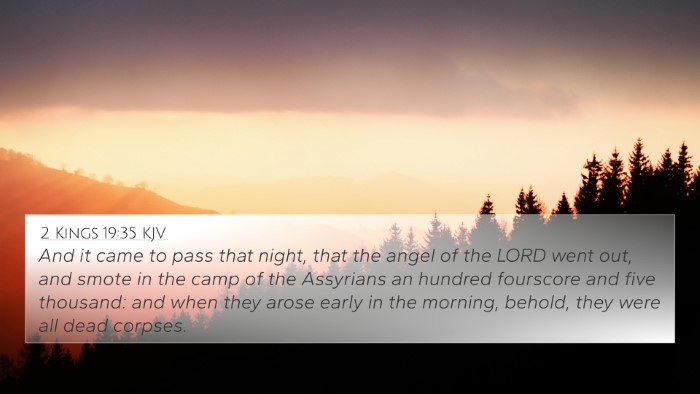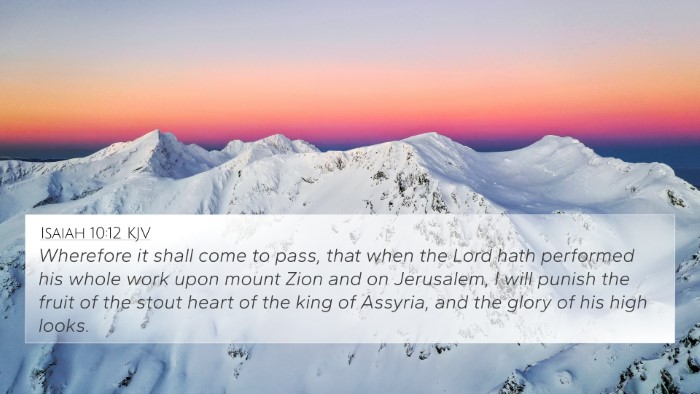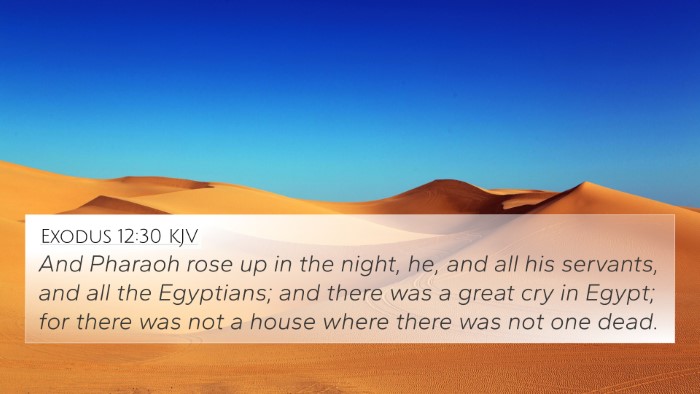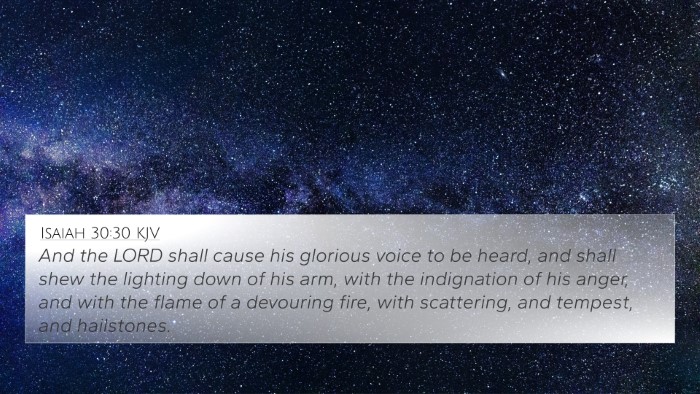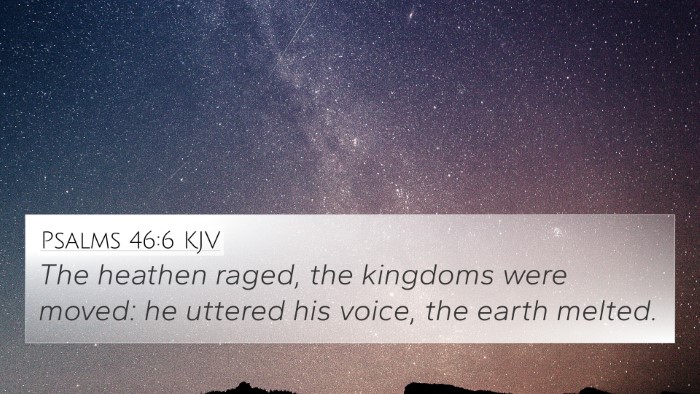Meaning and Interpretation of Isaiah 37:36
Isaiah 37:36 states: "Then the angel of the Lord went forth, and smote in the camp of the Assyrians a hundred and eighty-five thousand: and when they arose early in the morning, behold, they were all dead corpses."
This verse is a remarkable account of divine intervention during a critical moment in Israel's history. The historical context involves the Assyrian siege of Jerusalem, led by King Sennacherib, who threatened the city and its inhabitants.
Summary of Insights from Public Domain Commentaries
Matthew Henry's Commentary:
Henry emphasizes the miraculous nature of the event, highlighting that the destruction of the Assyrian army was a direct act of God. He points out the angel of the Lord as a divine agent, reinforcing the idea that God fights for His people. The dramatic overnight slaughter of such a vast army illustrates both God's sovereignty and His ability to deliver His faithful from peril.
Albert Barnes' Notes:
Barnes elaborates on the significance of the numbers, indicating that the Assyrian forces vastly outnumbered the Jews, making this victory miraculous. He notes the lack of human military action in this deliverance, underscoring the theme that God does not require human means to accomplish His purposes. The phrase "and behold" serves to draw the reader's attention to the stark contrast between the might of the Assyrians and their sudden defeat.
Adam Clarke's Commentary:
Clarke provides a theological perspective on the verse, interpreting it as a testament to God's power over evil and His protection of His people. He mentions the role of prayer and supplication made by King Hezekiah, tying it to the miraculous outcome. Clarke's analysis encourages believers to have faith in God’s ability to deliver in times of crisis.
Cross-References Related to Isaiah 37:36
This verse connects with several other biblical passages that share similar themes of divine intervention, miraculous deliverance, and God's sovereignty:
- 2 Kings 19:35 - A parallel account of the death of the Assyrian warriors, emphasizing God's protection over Jerusalem.
- Psalms 46:1 - "God is our refuge and strength, a very present help in trouble," reflecting God's protective nature.
- Psalms 91:5-7 - A promise of safety amidst dangers, which aligns with Israel's situation during the Assyrian threat.
- Isaiah 31:4 - God’s assurance of deliverance from enemies, highlighting His role as a protector.
- Isaiah 40:10 - Emphasizes God's might and power in delivering His people from oppression.
- Jeremiah 30:16 - God's commitment to protect and restore His people, tying into the event described in Isaiah.
- Matthew 26:53 - Jesus reflects on divine intervention and angelic assistance during a time of crisis.
Thematic Connections between Bible Verses
This account in Isaiah not only serves as a historical narrative but also offers rich thematic connections with other Bible verses, reinforcing the concept of God's sovereignty in spiritual warfare and His ability to save His people:
- Divine Intervention: The angel of the Lord's action mirrors instances of divine intervention found throughout scripture, such as Exodus 14:20 with the parting of the Red Sea.
- Faith in God: The necessity of faith, as seen in Hebrews 11:1, is illustrated by Hezekiah's reliance on God during dire circumstances.
- Prayer and Deliverance: The prayer of Hezekiah (Isaiah 37:15-20) is a precursor to this miraculous event, akin to James 5:16 which emphasizes the power of fervent prayer.
- God's Protection: Similar themes are echoed in Proverbs 18:10, where the name of the Lord is described as a strong tower for the righteous.
Understanding the Significance of Cross-Referencing Bible Verses
Studying Bible verse cross-references allows believers to gain a comprehensive understanding of biblical teachings and themes. Here are some tools and methods that can aid in this study:
- Bible Concordance: A useful tool for locating scripture passages and exploring thematic connections.
- Bible Cross-Reference Guide: These guides provide relevant verses linked by thematic or narrative similarities.
- Cross-Reference Bible Study: Engaging in study groups that utilize cross-references can enhance understanding and encourage deeper engagement with the text.
- How to Use Bible Cross-References: Learning to identify and utilize cross-references can deepen one’s biblical literacy and understanding of inter-Biblical dialogue.
Conclusion
The miraculous account in Isaiah 37:36 serves not only as an historical event but also provides believers with lessons in faith, reliance on God, and the understanding of His protective power. Through cross-referencing Biblical texts and drawing connections between passages, one can cultivate a richer understanding of scripture, enabling a more profound application of its truths in life.



